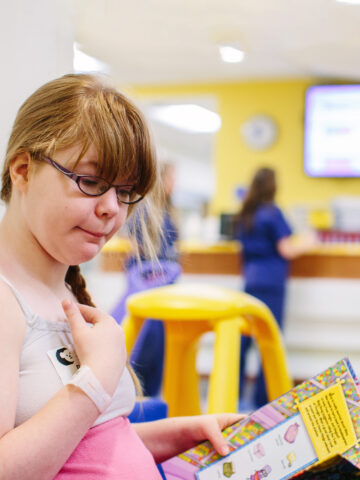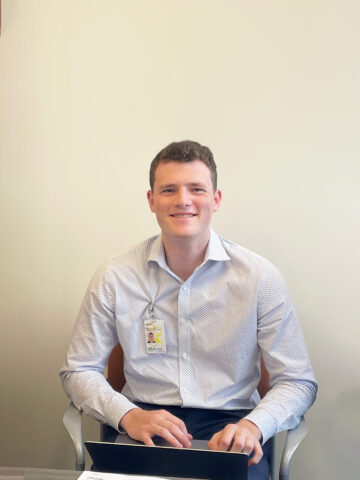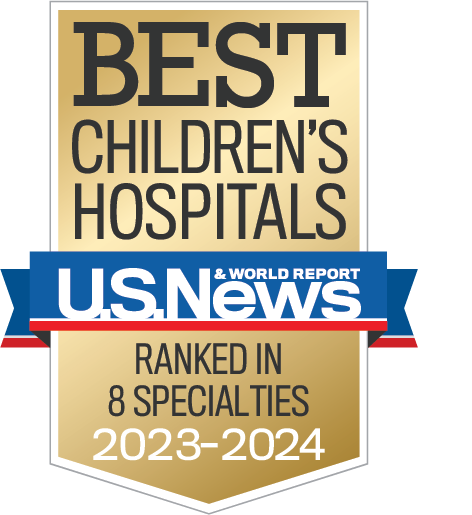At the inaugural CHOC/UCI Rare Disease Symposium and Family Conference, participants struck a common chord:
Never give up on a child, and never lose hope while searching for a breakthrough therapy.
“If you’re a child or parents of a child with a rare disease, you feel very alone,” said CHOC Chief Scientific Officer Dr. Terence Sanger. “It’s about alone as you can be. You’re a member of 8 billion people on this Earth, but you’re also a member of a very small, select, and in many cases not particularly fortunate subgroup.”
Parvathy Krishnan knows that feeling.
Her two young children, Ira and Yash, have Constitutional Mismatch Repair Deficiency (CMMRD), a rare hereditary disorder that greatly increases the risk of developing one or more types of cancer.
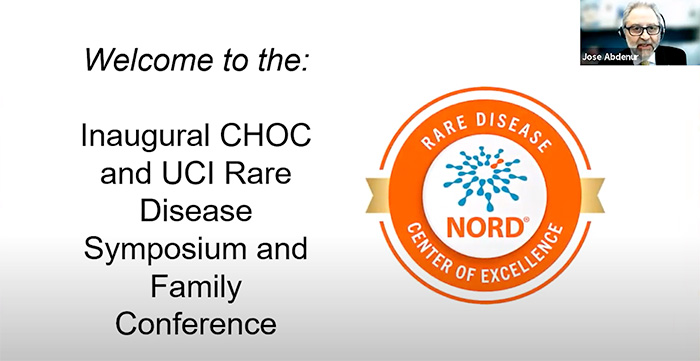
and Family Conference
“Every diagnosis is like a car or train wreck, and it just kept going,” said Parvathy, foundational alliance director at Global Genes, an Aliso Viejo-based non-profit that advocates for the rare disease community. “Most of the time, you’re holding onto the very last thread of hope to make a case for your loved ones and trying to keep it together so you can support them.”
Dr. Sanger and Parvathy were among the speakers at the March 11 virtual event that marked the first seminar for CHOC and the University of California, Irvine (UCI) Health since both were designated a Rare Disease Center of Excellence by the National Organization for Rare Disorders (NORD).
The NORD designation highlights CHOC’s emergence as a growing pediatrics leader in rare disease in the clinical genetics field, keynote speaker Dr. Marshall Summar, director of the Division of Genetics and Metabolism at Children’s National Hospital in Washington, D.C., said in an interview.
The symposium attracted 300 researchers, pediatricians, data scientists, students, scientists and families who heard presentations on topics including lysosomal diseases and gene therapy, the power of research and impact on patients, complex biological systems and rare diseases, and autism spectrum disorder and related diseases.
CHOC’s commitment to research and collaboration in the field of rare diseases
CHOC and UCI have a longstanding collaboration of rare disease management and advocacy, said symposium host Dr. Jose Abdenur, chief of the division of metabolic disorders and director of the metabolic laboratory at CHOC and director of the CHOC/UCI NORD Center of Excellence.
He works closely with Dr. Virginia Kimonis, a professor in the Division of Genetic and Genomic Medicine in the Department of Pediatrics, Neurology and Pathology at UCI, and the lead at UCI of the combined CHOC/UCI NORD Center of Excellence.
“This symposium is a testament to our commitment to increasing awareness and promoting research and collaboration in the field of rare diseases,” Dr. Abdenur added. “We’re really excited about this designation, and with it comes the responsibility of continuing along this path.”
CHOC is among 31 pediatric healthcare systems nationwide that make up the NORD Centers of Excellence.
The alliance aims to streamline the process for families seeking help, as well as lead to an increase in the number of multi-center rare disease clinical trials and more educational programs like the March 11 event. The alliance was created to achieve closer collaboration across the medical community and thus lead to new treatment guidelines, best practices, and knowledge sharing.
Improvement in rare disease health outcomes is not possible without the involvement of families, many panelists said. Their voices and knowledge, they said, are irreplaceable for understanding the effects of a rare disease.
There are more than 7,000 rare diseases and between 25 million and 30 million Americans are estimated to be currently living with rare diseases. More than 90% of rare diseases lack an FDA-approved treatment.
Most rare diseases are diagnosed in the pediatric population, but many remain unrecognized until adolescence or adulthood.
‘Hope is in our genes,‘ an effort to send the diagnostic odyssey of rare diseases
Dr. Kimonis said she’s particularly proud of the resilience of patients and families living with a rare disease.
“When people have a rare disease, collectively, (it becomes) a common disease,” Dr. Kimonis said.
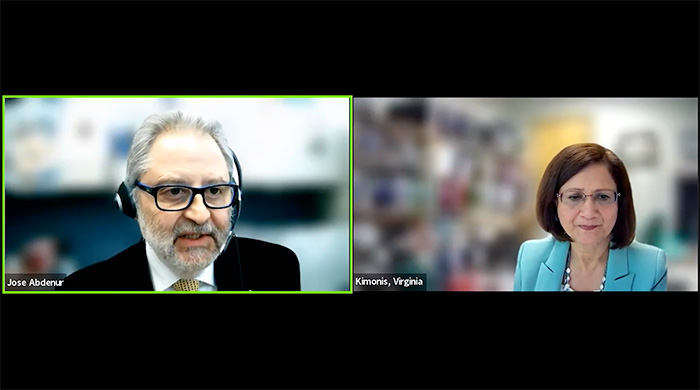
The goal of rare disease research is to shorten or end the diagnostic odyssey families face, she added. More education, outreach, and funding is needed, she said.
Several of Dr. Kimonis’ UCI colleagues participated in the symposium, including Anne Calof, PhD, who spoke on the Complex Biological Systems and Rare Diseases panel; Mark Mapstone, PhD, who spoke on the ASD Related and Rare Diseases panel; and Dr. Fabiola Quintero-Rivera, who moderated the Complex Biological Systems and Rare Diseases session.
Yasamin Fazeli, together with several UCI undergraduate students, established the NORD Students for Rare chapter at UC Irvine in 2020. The purpose of the organization is to spread awareness and recognition of rare diseases, to establish professional relationships, and to promote career opportunities within the rare disease space. This group (Yasamin, along with Anne Wu and Aneesah Akhbar) also worked hard in co-organizing the CHOC/UCI Rare Disease Symposium and Family Conference.
“I am excited that the NORD designation will lead to increased synergy and collaborative efforts to spread awareness and find novel ways to research and treat rare diseases,” Dr. Kimonis said.
Brent Dethlefs, executive director of the CHOC Research Institute, attended a recent rare disease symposium with patients and their parents and called it a “transformative experience.”
He cited the slogan of Global Genes, “Hope is in our genes,” as an inspiration.
Brent said hospitals can do a better job being partners with parents of children with rare diseases, particularly getting families involved long before a clinical trial starts.
Genome-editing strategies
Dr. Raymond Wang, a metabolic disorders specialist and director of the Foundation of Caring Lysosomal Storage Disorder Program at CHOC, hosted a session on lysosomal storage diseases and gene therapy.
CHOC’s Chloe Christensen, PhD, of the Wang Lab, detailed genome-editing strategies for Pompe disease, an inherited disorder caused by the buildup of the complex sugar glycogen in the body’s cells. The accumulation of glycogen in certain organs and tissues, especially muscles, impairs their ability to function normally.
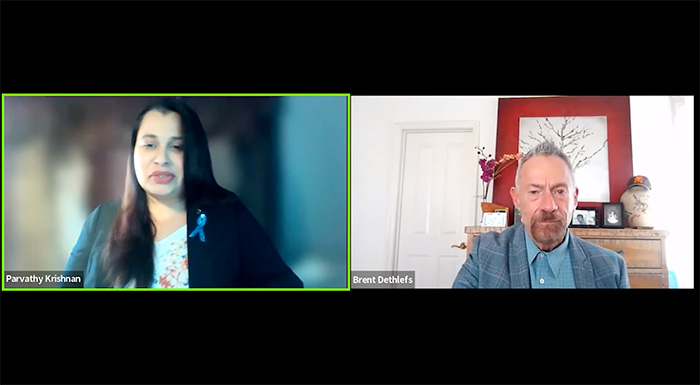
“The Wang Lab here at CHOC strives to give hope to patients who have rare genetic disorders,” Chloe said. “Although there are therapeutic options for many patients with lysosomal diseases, these therapeutics fail to fully address clinical symptoms.
“Our mission is to provide access to investigational treatments for patients who currently lack therapeutic options and to conduct translational research to develop next-generation strategies that will address the unmet needs of patients with lysosomal diseases.”
Pompe disease occurs in about 1 in 40,000 newborns whose life expectancy is less than 1 year without treatment.
CHOC is trying to improve on existing genome-editing techniques, including the use of precision tools that cut DNA at a specific site to introduce a desired change at the location.
“It’s a personalized therapeutic strategy,” Chloe explained.
Educational videos on rare conditions to come
Dr. Summar, in his keynote presentation, said NORD Centers of Excellence soon will have access to educational videos for patients and their families.
“When a family comes to a clinic and you tell them something they didn’t want to hear, after a certain point, they stop listening,” he said.
Families will be able to watch the 3-minute videos on an app to learn more about their child’s condition.
“We found this has been very powerful for patients and their families,” Dr. Summar said.
Also set to roll out later this year is a web-based system for data collection, REDCap.
“It’s Wikipedia meets Reddit meets Word Press,” Dr. Summar said.
‘A real commitment’ to providing excellent care to children with rare diseases
CHOC neurologist Dr. Tom Megerian, medical director of the Thompson Autism and Neurodevelopmental Center at CHOC (TACC), noted in his presentation that autism spectrum disorder (ASD) is a description of symptoms that result from a multitude of different disorders.
“Many of us forget that ASD often is not a single disorder,” said Dr. Megerian, noting more than 1,000 genes have been identified as risk factors for autism.
He said between 70-90% of cases of autism are attributed to genetic causes
“Genetic abnormalities are really the largest risk factor for autism, despite what you may hear in the lay press, but these genes have a complex relationship with the environment and developmental and other genetic factors,” Dr. Megerian noted.
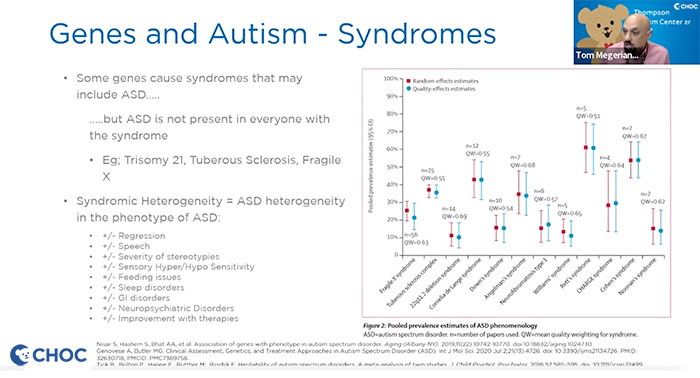
Dr. Sanger thanked participants and NORD and Global Genes.
“I’m very proud of not only this symposium, but what this symposium represents: a real commitment to our most vulnerable children,” he said in closing remarks.
“I think it’s our responsibility to support children with rare disorders and find ways to make them better,” Dr. Sanger added. “These children are no less special and no less important to us than any other children. And we dedicate a considerate amount of effort to trying to understand these disorders.
“Unlike rare disorders, If you devote effort to a non-rare disorder, then you expect there’s a multiplier effect. You do one research study, you do one clinical trial, and suddenly it affects hundreds or thousands or millions of people.
“So how much more dedicated to children do you have to be when you spend years of your life working on a problem for which there are only a few hundred people in the world with that particular disorder?
“But if you don’t do it, then you have given up on those few hundred children. And we’re not going to do that.”
For more information on the NORD Rare Disease Centers of Excellence program and the full list of centers, visit the program website.
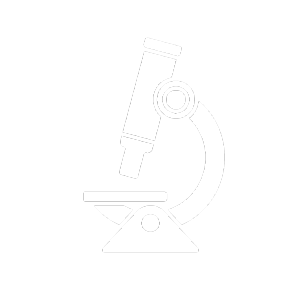
Learn about pediatric research and clinical trials at CHOC

